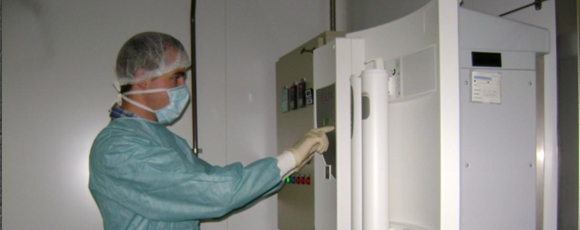
Cutting-edge research: Genius Biotherapeutics employs several full-time research staff. Image courtesy of Genius Biotherapeutics.
Genius Biotherapeutics, formerly known as Bioclones, is South Africa’s oldest and largest biotechnology company in human therapeutics.
We spoke to Ismet Amod, CEO of Genius Biotherapeutics and its subsidiary, Ribotech, about the journey from Bioclones to Genius Biotherapeutics and the future of the company.
Bioclones was started in 1982 to produce pharmaceuticals in Africa, for African markets. Since 1997, it has produced recombinant erythropoietin,
a hormone that controls production of red blood cells.
The drug is licensed in South Africa (SA) as Repotin®, for the treatment of chemotherapy- or renal failure-associated anaemia.
In addition, Ribotech plans to produce Granulocyte Colony Stimulating Factor (GCS-F), another biosimilar product that promotes white blood stem
cell formation. It is also used for chemotherapy recovery.
Amod has headed up both companies as acting CEO since 2011, and in 2013 the position was formalised. He said that the name change was as a result
of a decision to list Bioclones offshore: “The change to Genius Biotherapeutics was chosen by the previous CEO in 2009, when the possibility
of listing Bioclones offshore was realised.”
Since then, the company has been granted permission by the SA government to apply for listing on either the London Stock Exchange or NASDAQ. This
is a necessary step to raise enough capital for clinical trials and commercialisation of future products.
Driven by research
Research is vital to the continued success of Genius Biotherapeutics. Currently, the company has two products in development, and is
launching a new company, Integrated BioWorks. “This new venture will focus on a very lucrative sector of the laboratory reagents market,” said Amod.
The products under development are a novel cancer therapeutic, which uses a type of immune cell called a dendritic cell to produce cancer-specific
antibodies (registered as Dendrovac), and Retroinverso peptides, which show potential as orally-administered vaccines.
A strategic partnership with an American biotechnology company called Hemispherx Biopharma, announced in June this year, was established to help move
Dendrovac research towards commercialisation.
“The opportunity to collaborate with Hemispherx may well prove to be a valuable one,” said Amod. “Hemispherx are the manufacturers of
Ampligen, a key component required for the maturation of the dendritic cells to be used in the development of our cancer therapeutic vaccine. We are
pleased with the progress we are making in this field in collaboration with a research group at the University of Cape Town.”
Ampligen will help to mature the dendritic cells, thus forming a vital part of the development process. The experiments will focus on breast cancer and
prostate cancer, two of the most common cancers in South Africa. In addition, Hemispherx and Genius Biopharmaceuticals will jointly launch a clinical
trial in Cape Town to test another Hemispherx product called Alferon, a potent antiviral drug, as an HIV therapy.
Biotechnology pioneers
With such a long history of biotechnology research and development in South Africa, Genius Biotherapeutics had a major impact on the
biotechnology sector in South Africa.
“I think our contribution over the years has been a catalytic one and we will continue to act in this role. Bioclones has been a trail blazer
and a pioneer in biotechnology since the 80s,” said Amod. “As a ‘prototype’ biotech company we have acted as a stimulus to
support and strengthen the industry.”
The company has also supported South African skills development. “We have over the years trained many a pharmacist and scientist in biosimilar
manufacture, particularly in relation to cell culture techniques and in the science of protein purification, fields in which there has been very little
opportunity available,” explains Amod.
“Right now we are in discussions with the International Centre for Genetic Engineering and Biotechnology (ICGEB) in Italy to train local
graduates for a short period on some essential tests we require.”
He said that to stay competitive in this industry, you have to be extremely aware of the changing landscape. Every year, new technologies and
innovations mean that your product may suddenly become obsolete; alternatively these changes could decrease your operating costs and production
time if you can take advantage of them.
Finally, Amod has some advice for South African biotech entrepreneurs: “Look at the biotech industry holistically across the various disciplines.
A problem in one sector often leads to a solution from another sector and vice versa. You must be able to connect the dots across the various disciplines,
seek out opportunities or find new and improved solutions to old problems.”
Ismet Amod is CEO of Genius Biotherapeutics and Ribotech in
Cape Town. Both companies fall under the umbrella of Sekunjalo Investment Group.
|
|